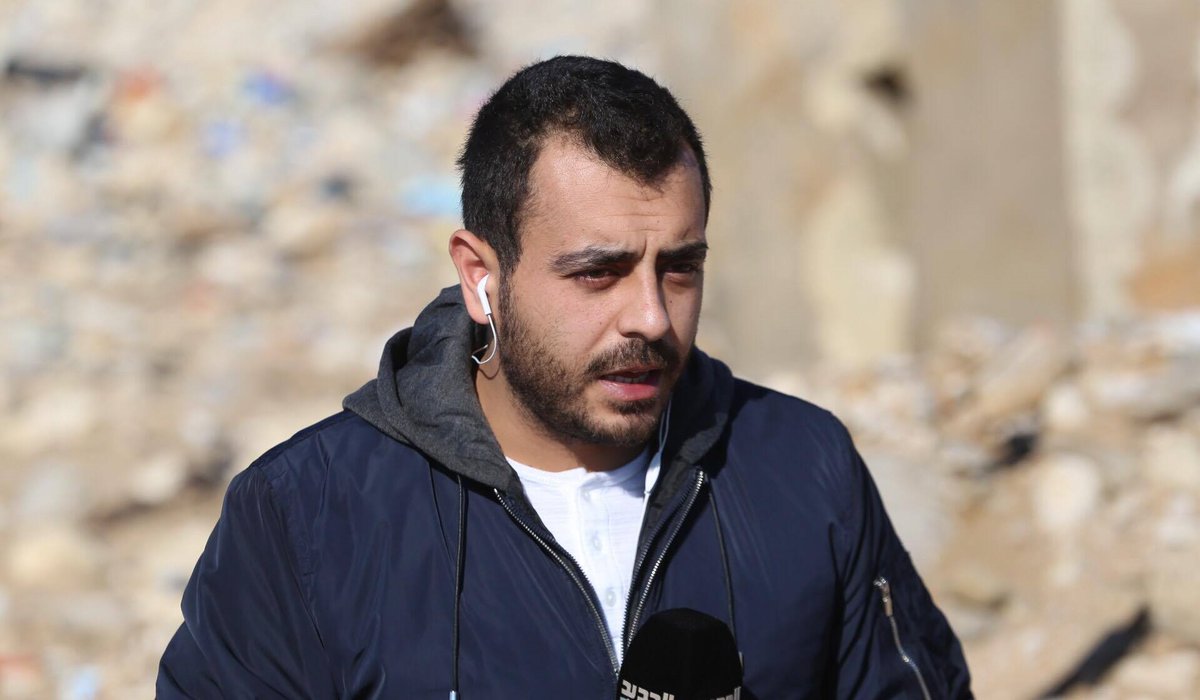Freedom of the press in Lebanon has recently been under scrutiny- and rightly so.
Lebanon dropped yet another spot in Reporters Without Borders’ Press Freedom Index, described as having a “highly politicized media” and expressing concern for press freedom as a whole. However, Lebanon’s ranking on the index has been roughly the same over the past decade with minor fluctuations, where most of what appears to be positive is due to worsening press freedoms elsewhere. In Freedom House’s respective index, Lebanon, too, has remained along the same “partly free” range, with small fluctuations and an unchanging legal framework between 2004 and 2017. In fact, during that period, the most promising period of improvement took place towards the end of 2004, when Lebanon was still under Syrian occupation and the press took greater part in critical and adversarial journalism.
Lebanon is often considered as a bastion of freedoms in a region filled with censorship and oppression. It does fair far better than most in the region when it comes to freedom of the press, but that doesn’t say much when your regional counterparts include Iran, Saudi Arabia, Egypt, Syria, and Turkey. We’re talking about Turkey, the country that according to the Committee To Protect Journalists has the most journalists currently detained, Saudi Arabia, which has assassinated journalist Jamal Khashoggi, and Iran, which has detained and flogged journalists for covering protests.
The root of Lebanon’s press freedom problem does not lie in who occupies certain seats in the political apparatus. It’s rooted in Lebanon’s economic and legal system, which has paved the way for the current media and press ecosystem. The media, owned by a handful of families with business and political interests, mostly or entirely reproduces their talking-points and perspectives.
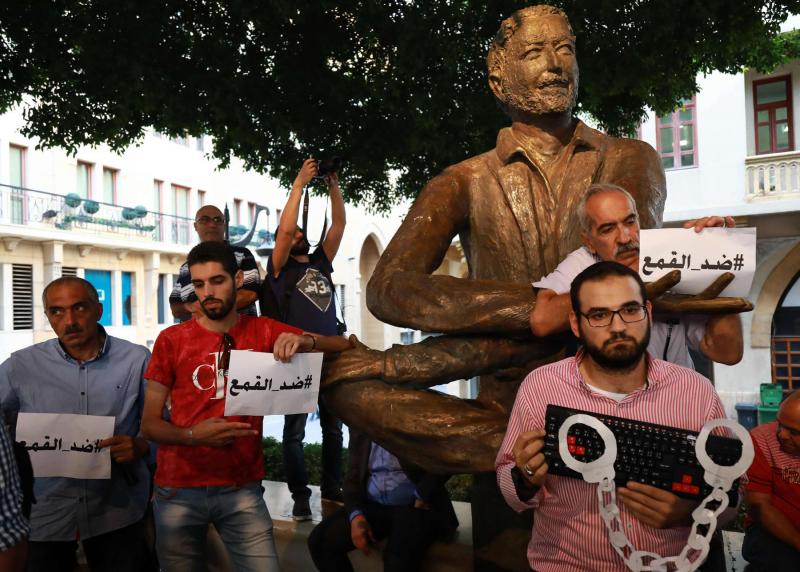
Welcome to the family
At first glance, Lebanon’s general media landscape comes off as diverse, with a multitude of news platforms across different mediums, implying editorial diversity and freedom. That simply couldn’t be further from the truth.
Much like the country’s political and economic power, the ownership and control of media platforms in Lebanon is in the hands of a few families and political parties. According to Lebanon’s Media Ownership Monitor, a collaborative project between The Samir Kassir Foundation and Reporters Without Borders, at least 43 percent of media outlets have at least one member of 12 families in ownership, its board, or both. Among the most notable families are the Hariris, the Tuenis, the Murrs, the Mikatis, and the Aouns, all with their political ambitions for their respective political parties. Take the Hariri family, for example. Headed by Prime Minister Saad Hariri, the family partial or full ownership not only in their Future Movement’s party mouthpieces, Future TV and al-Mustaqbal newspaper, but also Annahar and The Daily Star newspapers.
The remaining percentage of the Lebanese press are also influenced heavily or entirely by political or business interests.
An example is Al-Manar television station, which serves as Hezbollah’s party position and rhetoric. Even outlets that are seen as more impartial are not free from these shackles. LBCI television, which is often seen as a platform sympathetic to civil society, includes 20 percent ownership of business magnate and former MP Issam Fares and 4 percent by the Mikati family. Majority shareholder and CEO Pierre Daher previously took arms and fought alongside the Lebanese Forces militia during the civil war.
In addition to toeing their respective parties’ lines, they also promote and maintain the establishment and the status quo. We often see most media platforms deliberately scapegoating and vilifying Syrian refugees as the source of Lebanon’s economic and security problems and reinforcing racist and problematic narratives from those in power. Moreover, in 2015, when Lebanese people mobilized against the government and ruling class over the garbage crisis, they were taken down and vilified through most or all of the press. Of course, this is done to cater their respective audiences; the Free Patriotic Movement’s OTV blamed the protests for worsening tourism in Lebanon, and the Future Movement’s Future TV discredited the protest as a political Shia-led effort to destabilize the country.
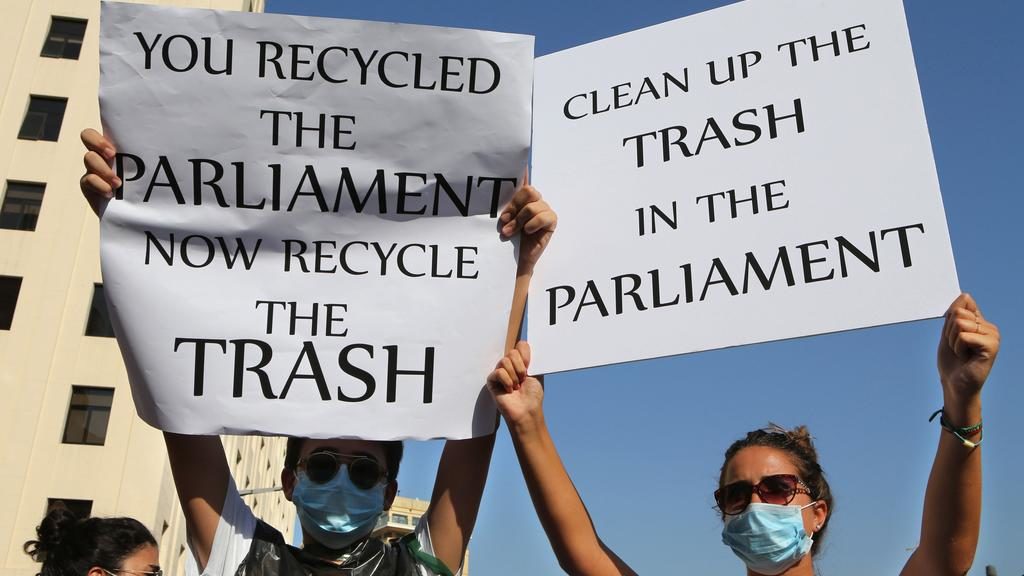
The media family extends into the one official entity that ought to be inclusive and diligent defenders of press freedom and media workers’ rights: Lebanon’s Press Syndicate. With an executive board and membership representing Lebanon’s partisan platforms and even some political parties directly, altering the existing character and power structures within the syndicate is virtually impossible.
The syndicate does not give space for independent media, unaffiliated with Lebanon’s ruling class, and has not taken action to protect or stand for any journalists or media workers that have faced oppression of any kind. More recently in 2018, prior to the country’s long-awaited parliamentary elections, the press faced crackdowns from the state to maintain the establishment from any extreme criticism and challenges.
Of course, this excludes other issues, such as the inability of non-Lebanese nationals, including those with only Lebanese mothers, to be part of the syndicate.
Freedom of the Press: Beyond the Cybercrimes Bureau
In light of recent coverage of press freedom and freedom of expression shrinking, regressing, or worsening, there has been almost a sole focus on the Cybercrime and Intellectual Property Bureau under the Internal Security Forces. This division, though tasked to handle actual cybercrimes such as sextortion, hacking, and online money laundering, has been also tasked by the Public Prosecution to summon and interrogate people over alleged defamation and slander of public officials and corporate fat cats. In addition, it’s illegal for journalists for journalists to be summoned by the bureau; rather, they should directly go to the Publications Court instead.
In addition to the exploitation of the defamation and slander laws from the Cybercrimes Bureau, we also see the same from other security institutions that also consider the work of adversarial journalists security threats.
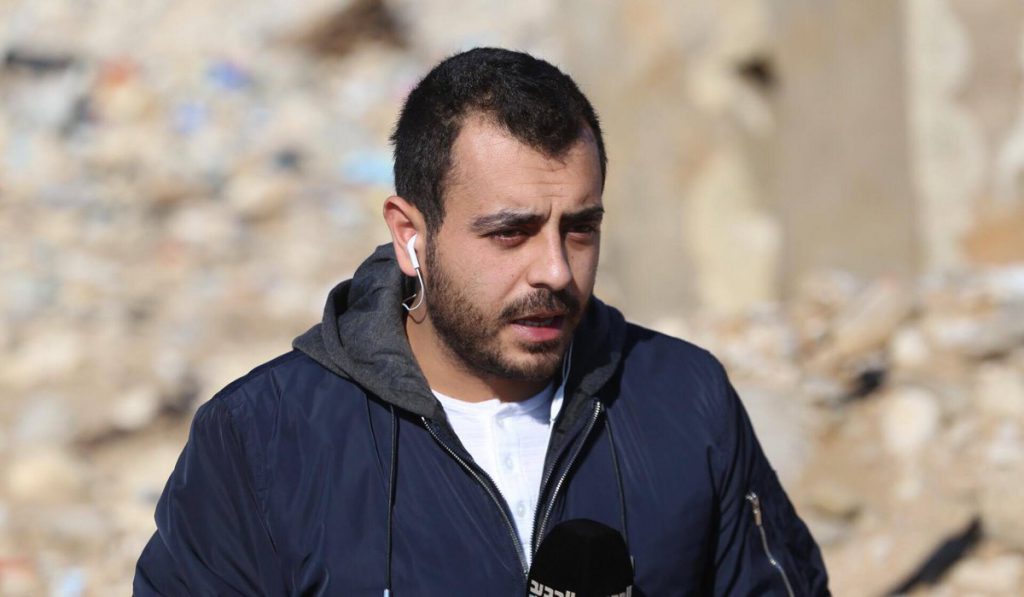
Journalists, as are others, are even at risk of standing at military court. Adam Chamseddine of Al-Jadeed television was interrogated in January 2019 and was sentenced in March in absentia to three months of prison. His crime? Criticizing Lebanon’s State Security in a Facebook post following a television report he curated. On April 12, the case was sent back to Military Prosecutor Peter Germanos from a separate judge, who did not see any laws violated. Germanos eventually tabled the case entirely on April 25.
Though Chamseddine no longer faces the risk of imprisonment, whether through a military court or Lebanon’s Publications Court, what kind of a message does it send to journalists who want to investigate and criticize the work of Lebanon’s security apparatus? Going forward, Lebanon’s recently passed E-Transactions Law, or Law 81.
The new law gives legal space to prosecute and even shut down platforms or the social media accounts of anyone –journalists included– under the broad umbrella of “internal and external security.” Alternative media and press, which heavily relies on social media, are now at greater risk.
Chamseddine is not an anomaly when it comes to journalists having to face security authorities outside of the ISF. Journalist and activist Mohammad Awad was interrogated by General Security over his articles that criticized President Michel Aoun, Prime Minister Saad Hariri, and Speaker of Parliament Nabih Berri, as well as religious officials. He had to pledge to not mention the aforementioned officials again online or in his work.
Non-Lebanese journalists face even greater risk, and suffer harsher punishments than their Lebanese counterparts. In November 2018, Syrian journalist Abdel Hafez al-Houlani was summoned and arrested by State Security over an article he wrote on pro-opposition platform Zaman al-Wasl. The article alleged that 20 pregnant Syrian women miscarried due to drinking polluted water in Arsal. He was held for three weeks and transferred to a court for allegedly “inciting sectarianism.” He was only released after paying a $700 fine and added a note in the article that states it does not accuse anyone in Lebanon for what was allegedly reported.
In 2013, Palestinian-Lebanese freelance journalist Rami Aysha was revoked of his press license and sentenced to prison for investigating arms smuggling between Lebanon and Syria. Aysha was detained with two other men by Hezbollah forces in 2012 at the Lebanon-Syria border, then transferred to government custody where he was tried in a military court and accused of smuggling weapons himself. The journalist told the Committee to Protect Journalists that he was beaten both in Hezbollah and government custody.
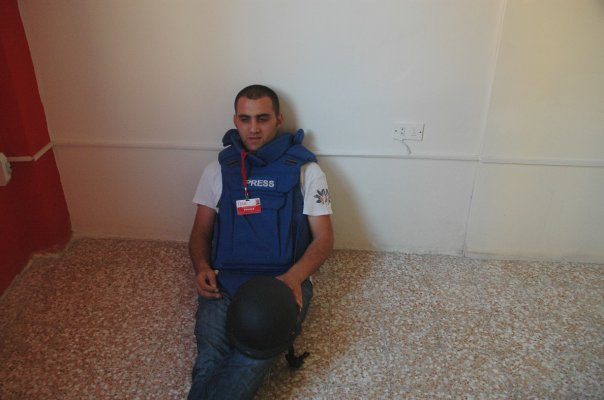
Journalists continue to be seen as as a security threat
Away from courts and offices, security forces in Lebanon have attacked journalists and those in the media industry for their work. On December 23, 2018, during protests over the economy in Lebanon, the Army and Internal Security Forces attacked at least four journalists and photographers.
Among them is Hasan Shaaban, photographer for Reuters and English-language newspaper The Daily Star. In a video he shared of his attack, soldiers harassed him yelling, “Who are you taking pictures of? Are you photographing the army?” Shaaban could be heard telling them that he’s a journalist. Photos and videos emerged of the photographer grabbed by the neck and taken down. That same afternoon, security forces also attacked reporter Rachel Karam and cameraman Zakaria al-Khatib of Lebanon’s Al-Jadeed television while they reported on protests taking place at Beirut’s Hamra Street. Photographer for local daily Al-Joumhouria, Richard Sammour, was also hit over the head, and shared a photo of his injury.
As all recent cases related to stifling freedom of the press in Lebanon, these aren’t unique. Lebanon’s garbage crisis protests in 2015 also had its fair share of physical attacks on the press. On August 22 and 23 alone, where riots broke out, SKeyes documented at least 13 cases of journalists and media workers being attacked by security forces. In addition, journalists who entered the Ministry of Environment to report on a group of activists holding a sit-in were attacked and forcibly removed from the building. Among them is now former LBC television reporter Foutoun Raad, who added that security forces even cut off cables to cut the signal from broadcasting. Many of these cases included the confiscation or destruction of their equipment.
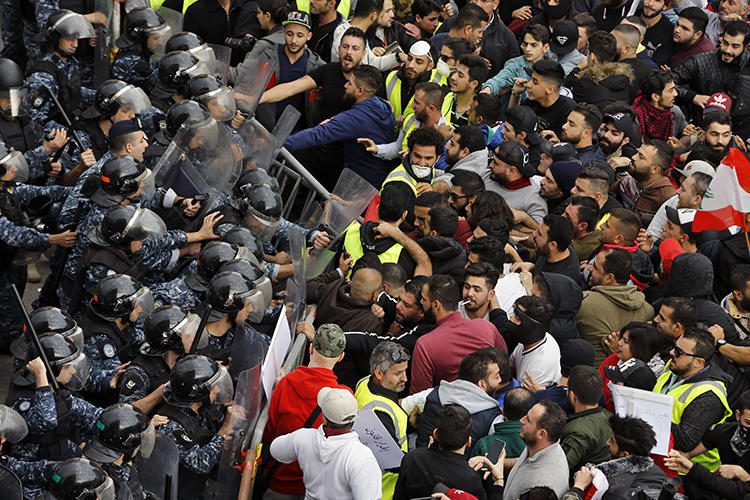
During a protest that I was covering a few days later in Martyrs Square, security forces in riot gear, again, attacked journalists and photographers. I recall an officer jumping on a photographer and beating him as he yelled, “I’m a journalist!” several times. The officer stopped, asked the photographer for his press pass, looked at it, and then let him go. This was after beating him, and potentially damaging his equipment.
In an unprecedented development, it also appeared that the Lebanese security apparatus may have also impersonated journalists at peaceful civil society protests as recently as August 2018. Some journalists noticed that some were even wearing press vests as they took pictures.
“Well, you’ve ruined Lebanon’s image”
Reporting, investigations, and adversarial journalism in general is seen in a negative light, if it exposes or covers something negative in Lebanon. It’s seen as something that ruins Lebanon’s reputation to tourists and investors.
In recent years, the reporting of Lebanon’s political corruption and environmental crisis, among other problems, has been blamed for its declining tourism industry. Head of the Syndicate of Hotel Owners, Pierre Achkar told Annahar in July 2018 that there is a “media war” targeting the country’s tourism industry.
Even the minister of tourism himself echoed similar sentiments. In an interview with The Daily Star, Tourism Minister Avedis Guidanian said the “bad image” of Lebanon is due to media coverage. “We love to say in the media that Lebanon is covered in trash, that the sea is polluted and that it’s the most expensive tourist destination in the world,” he added. “Well, you’ve ruined Lebanon’s image.”
Press freedom in Lebanon cannot be achieved when journalism and public relations are intertwined. Journalism is not seen as a tool to hold those accountable, to promote transparency, and to bridge the gap between authority and ordinary people. It’s seen as an extension of public relations. This is not just factually incorrect, but it’s also dangerous to what’s left of Lebanon’s semi-democracy and hopes for genuine press freedom.
But with the media owned by a select few with political, economic, and business interests to promote, we cannot expect that distinction to be made in the first place. The Lebanese press, due to its ownership of a few wealthy families and ruling parties with economic and political ambitions, as well as a security apparatus that has protected the ruling class from adversarial journalism, has been seen and interpreted by the general public as an extension of corporate public relations.
In late January, lawmakers debated a bill that could overhaul the country’s media laws. Whether or not this would expand or shrink existing legal measures to oppress journalists is to be seen. However, the existing landscape which hinders freedom of the press in Lebanon needs more than the passing of –possibly– improved legislation to change for the better.


